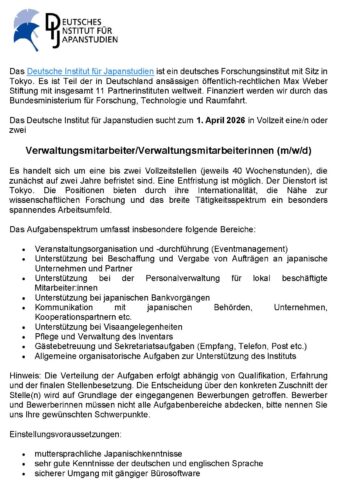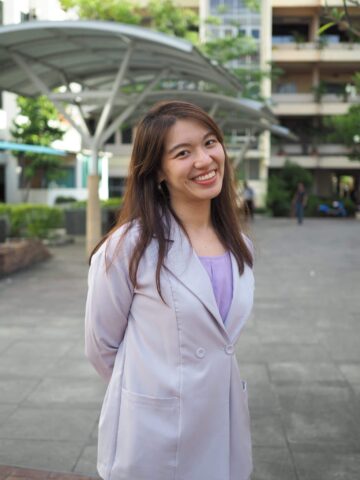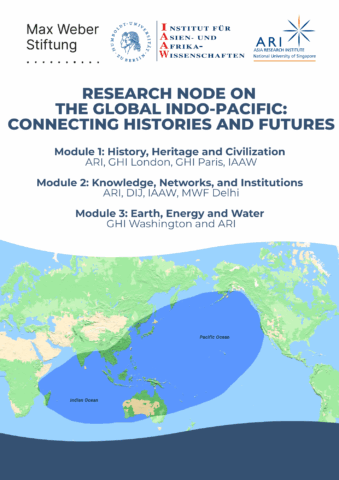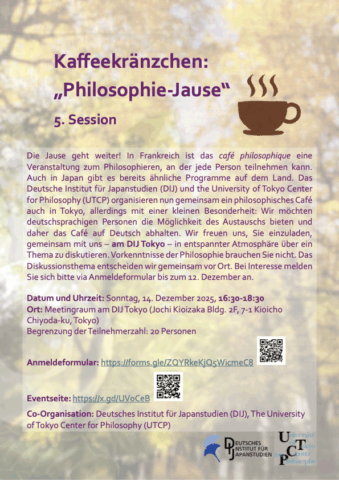イベント&アクティビティ
Harald Kümmerle interviewed about Japanese digital strategy
-480x435.jpg)
“Japan’s digital policy is consensus-driven, differing from both Western and Chinese approaches”, says DIJ researcher Harald Kümmerle in a recent interview with Nikkei X-Tech, an online news portal of Japanese newspaper Nikkei Shinbun. Building on a widely recognised classification of global digital governance into three ideal types – market-driven (US), state-driven (China), and rights-driven (EU) – Kümmerle proposes Japan’s consensus-driven model as a distinct fourth type. This model, he argues, is characterized by soft regulation and administrative guidance rather than formal rule-making. This provides both opportunities and challenges. As Harald notes in the interview, “If Japan can expand its circle of partners among Indo-Pacific nations in the field of economic security, it may be able to mediate between the EU and the US.” The article (in Japanese) is available here.
Season’s Greetings and best wishes for the New Year
 Das Deutsche Institut für Japanstudien wünscht erholsame und frohe Festtage und einen guten Start in ein erfolgreiches Jahr des Pferdes!
Das Deutsche Institut für Japanstudien wünscht erholsame und frohe Festtage und einen guten Start in ein erfolgreiches Jahr des Pferdes!
The German Institute for Japanese Studies wishes you a happy holiday season and a successful Year of the Horse!
ドイツ日本研究所一同、皆様のご多幸と来るべき新年が成功の年になることを祈念いたします。
Stellenausschreibung Verwaltungsmitarbeiter/Verwaltungsmitarbeiterinnen (m/w/d)
 Werden Sie Teil des DIJ-Teams in unserer Verwaltung! Die ausgeschriebenen Stellen umfassen insbesondere folgende Aufgaben: Veranstaltungsorganisation und -durchführung (Eventmanagement); Unterstützung bei Beschaffung und Vergabe von Aufträgen an japanische Unternehmen und Partner; Unterstützung bei der Personalverwaltung, bei japanischen Bankvorgängen und Visaangelegenheiten; Kommunikation mit japanischen Behörden, Unternehmen, Kooperationspartnern; Pflege und Verwaltung des Inventars; Gästebetreuung und Sekretariatsaufgaben (Empfang, Telefon, Post etc.); allgemeine organisatorische Aufgaben zur Unterstützung des Instituts. Wenn Sie muttersprachliche Japanischkenntnisse sowie sehr gute Kenntnisse der deutschen und englischen Sprache haben sowie sicher sind im Umgang mit Bürosoftware, freuen wir uns auf Ihre Bewerbung bis zum 8. Januar 2026. Die vollständige Ausschreibung finden Sie hier auf Deutsch und auf Japanisch.
Werden Sie Teil des DIJ-Teams in unserer Verwaltung! Die ausgeschriebenen Stellen umfassen insbesondere folgende Aufgaben: Veranstaltungsorganisation und -durchführung (Eventmanagement); Unterstützung bei Beschaffung und Vergabe von Aufträgen an japanische Unternehmen und Partner; Unterstützung bei der Personalverwaltung, bei japanischen Bankvorgängen und Visaangelegenheiten; Kommunikation mit japanischen Behörden, Unternehmen, Kooperationspartnern; Pflege und Verwaltung des Inventars; Gästebetreuung und Sekretariatsaufgaben (Empfang, Telefon, Post etc.); allgemeine organisatorische Aufgaben zur Unterstützung des Instituts. Wenn Sie muttersprachliche Japanischkenntnisse sowie sehr gute Kenntnisse der deutschen und englischen Sprache haben sowie sicher sind im Umgang mit Bürosoftware, freuen wir uns auf Ihre Bewerbung bis zum 8. Januar 2026. Die vollständige Ausschreibung finden Sie hier auf Deutsch und auf Japanisch.
Hybrid DIJ Study Group on the Political Economy of U.S. Military Bases
 This talk provides an overview of the economic and political impacts of the presence of U.S. military bases in Japan. International relations research has traditionally examined U.S. bases qualitatively, treating them as an outcome of U.S. global security strategy. In contrast, military economics focus on the economic effects of base closures and realignments in the United States and Europe. Studies examining the impact of U.S. bases on Japan remain scarce. This research addresses this gap by presenting the historical and strategic background of U.S. bases in Japan, alongside empirical evidence and case studies that illustrate the effects of these bases on surrounding communities. The project employs a mixed-methods design and explores the relationship between U.S. bases and Japanese municipalities using the original dataset “The United States Bases in Japan”, which draws on a wide range of primary and secondary sources. Details and registration here
This talk provides an overview of the economic and political impacts of the presence of U.S. military bases in Japan. International relations research has traditionally examined U.S. bases qualitatively, treating them as an outcome of U.S. global security strategy. In contrast, military economics focus on the economic effects of base closures and realignments in the United States and Europe. Studies examining the impact of U.S. bases on Japan remain scarce. This research addresses this gap by presenting the historical and strategic background of U.S. bases in Japan, alongside empirical evidence and case studies that illustrate the effects of these bases on surrounding communities. The project employs a mixed-methods design and explores the relationship between U.S. bases and Japanese municipalities using the original dataset “The United States Bases in Japan”, which draws on a wide range of primary and secondary sources. Details and registration here
Hybrid DIJ Study Group on Industrial Policy and Technology Transfer in Postwar Japan

Was the postwar economic miracle a result of the Japanese government’s industrial policy, or did it occur despite it? Numerous studies on the effects of government policy on industrial growth have produced contradictory or inconclusive findings. In this talk, Krautter argues that one of the main instruments of industrial policy toward growth industries was the licensing system for technology imports. Focusing on technology policy, he finds that the licensing system positively influenced the terms and conditions of technology imports. Krautter contends that the government’s role in postwar industrial development was more that of a coordinator rather than of a “leader” or “guide.” This view is reflected in the description of the Japanese state as a coordination state, contrasting with the well-known concept of the developmental state. Details and registration here
Call for Applications: Mobility Fellowships – Global Indo-Pacific
 We invite applications for mobility fellowships in the research node “Global Indo-Pacific: Connecting Histories and Futures” for research stays at any partner institution from one to two months between April and October 2026. The node presently includes researchers from five MWS institutes (DIJ Tokyo, GHI London, MWF Delhi, GHI Paris, GHI Washington), the Asia Research Institute (ARI) at the National University of Singapore and the Institute for Asian and African Studies at the Humboldt-Universität zu Berlin. Centered at ARI, it conducts research within the three modules “History, Heritage and Civilization”, “Knowledge, Networks and Institutions”, and “Earth, Energy and Water”. The mobility fellowships support self-chosen innovative research projects with links to one of the node’s module themes. This call for applications aims at strengthening and expanding networks within and beyond the research node. Application deadline: December 14, 2025. Details here
We invite applications for mobility fellowships in the research node “Global Indo-Pacific: Connecting Histories and Futures” for research stays at any partner institution from one to two months between April and October 2026. The node presently includes researchers from five MWS institutes (DIJ Tokyo, GHI London, MWF Delhi, GHI Paris, GHI Washington), the Asia Research Institute (ARI) at the National University of Singapore and the Institute for Asian and African Studies at the Humboldt-Universität zu Berlin. Centered at ARI, it conducts research within the three modules “History, Heritage and Civilization”, “Knowledge, Networks and Institutions”, and “Earth, Energy and Water”. The mobility fellowships support self-chosen innovative research projects with links to one of the node’s module themes. This call for applications aims at strengthening and expanding networks within and beyond the research node. Application deadline: December 14, 2025. Details here
Deutschsprachiges Kaffeekränzchen „Philosophie-Jause“
 Die Jause geht weiter! In Frankreich ist das café philosophique eine Veranstaltung zum Philosophieren, an der jede Person teilnehmen kann. Auch in Japan gibt es bereits ähnliche Programme auf dem Land. The University of Tokyo Center for Philosophy (UTCP) und das Deutsche Institut für Japanstudien (DIJ) organisieren gemeinsam ein philosophisches Café auch in Tokyo, allerdings mit einer kleinen Besonderheit: Wir möchten deutschsprachigen Personen die Möglichkeit des Austauschs bieten und daher das Café auf Deutsch abhalten. Das Organisationsteam (Yukiko Kuwayama, UTCP und Sebastian Polak-Rottmann, DIJ) freut sich, Sie wieder ins DIJ Tokyo einzuladen, um gemeinsam in entspannter Atmosphäre über ein Thema zu diskutieren. Fachliche Vorkenntnisse benötigen Sie nicht. Bei Interesse melden Sie sich bitte bis zum 12. Dezember an. Weitere Informationen hier
Die Jause geht weiter! In Frankreich ist das café philosophique eine Veranstaltung zum Philosophieren, an der jede Person teilnehmen kann. Auch in Japan gibt es bereits ähnliche Programme auf dem Land. The University of Tokyo Center for Philosophy (UTCP) und das Deutsche Institut für Japanstudien (DIJ) organisieren gemeinsam ein philosophisches Café auch in Tokyo, allerdings mit einer kleinen Besonderheit: Wir möchten deutschsprachigen Personen die Möglichkeit des Austauschs bieten und daher das Café auf Deutsch abhalten. Das Organisationsteam (Yukiko Kuwayama, UTCP und Sebastian Polak-Rottmann, DIJ) freut sich, Sie wieder ins DIJ Tokyo einzuladen, um gemeinsam in entspannter Atmosphäre über ein Thema zu diskutieren. Fachliche Vorkenntnisse benötigen Sie nicht. Bei Interesse melden Sie sich bitte bis zum 12. Dezember an. Weitere Informationen hier
Hybrid DIJ Study Group on Rape in Contemporary Japanese Women’s Literature
Rape represents a recurring theme in Japanese women’s literature. Even the earliest works created by Japanese women tell of rape, though over time these stories have been usurped and reinterpreted as tales of seduction and eroticism. While this reflects an androcentric worldview that still shapes perceptions of rape, Japanese women writers have long offered criticism and counter-concepts. Since the 1980s, as the discussion about sexual violence against women began in Japan, women authors have used literature to challenge androcentric conceptualizations of rape by writing from a female rape survivor’s perspective, criticizing romanticized and eroticized depictions by male authors. They contribute to breaking the taboo surrounding rape in everyday life, offering insight into women’s experiences and survival. This presentation examines selected works by contemporary Japanese women writers since the 1980s, comparing depictions of rape, trauma, and societal responses to show changes in the perception of raped women. Details and registration here
Speaker: Marija Tomic, University of Vienna/DIJ Tokyo





 Open Access
Open Access
